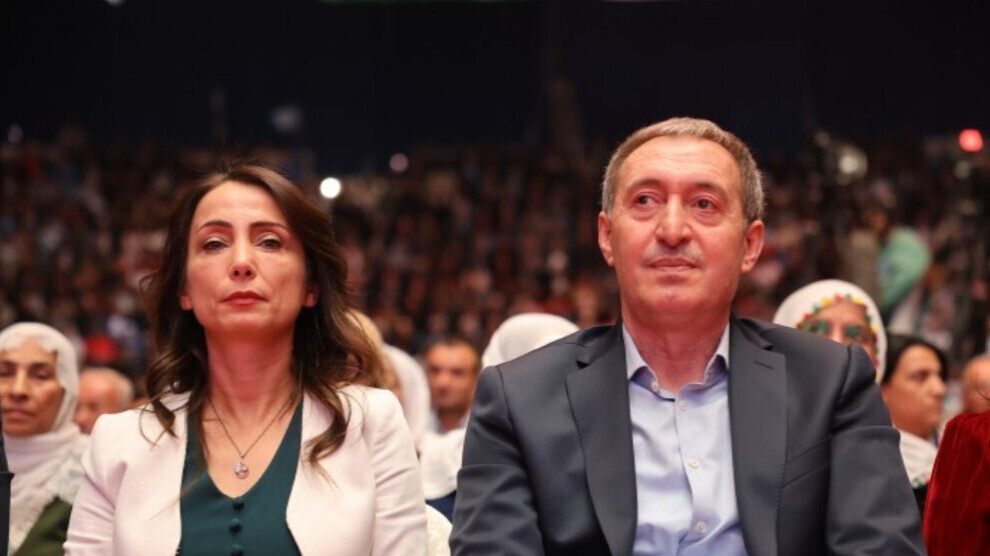HEDEP co-chairs: Political coup carried out on 4 November 2016 continues today
Seven years ago today, the arrest of Figen Yüksekdağ and Selahattin Demirtaş initiated a coup against democratic politics in Turkey that continues to this day.
Seven years ago today, the arrest of Figen Yüksekdağ and Selahattin Demirtaş initiated a coup against democratic politics in Turkey that continues to this day.

The two co-chairs of HEDEP - a political party in the tradition of the HDP, which until recently was called YSP (Green Left Party) - Tülay Hatimoğulları and Tuncer Bakırhan, spoke on Saturday in Ankara on the occasion of the seventh anniversary of the arrest of Yüksekdağ and Demirtaş of a “coup mechanism” that has affected all areas of life since 4 November 2016.
“Whether working people, women, youth, students or media professionals: every person who wants to breathe has been the target of the political power elite over the past seven years,” emphasized Hatimoğulları.
“The political campaign of annihilation is targeting all social groups,” added co-leader Bakırhan, accusing the Turkish judiciary of waging a war against democratic politics and thus being guilty of an attempted coup that goes against the will of the people.
“Despite the omnipresent repression, people have not missed the opportunity to resist over the past seven years: resistance from the prisons to the streets - for the right to the free development of their personality, for the right to political participation, for democracy and peace. Our duty and responsibility is to be worthy of this resistance, to defend democratic politics and to fight for the release of our imprisoned friends.”
On the night of 4 November 2016, the then HDP chairmen Figen Yüksekdağ and Selahattin Demirtaş were arrested in Turkey. The imprisonment on charges of “terrorist propaganda and membership in an armed terrorist organization” was carried out on direct orders from the then prime minister and current head of state Recep Tayyip Erdoğan, who saw the HDP’s gender-parity dual leadership as enemies. Other members of the party, which at the time was the only one to stand and fight for pluralism, tolerance, absolute gender equality, decentralization, direct and participatory democracy, peace, civil rights and social justice, were also arrested at the time. The mass arrests on 4 November 2016 began a phase of repression that continues to this day and is intended to render the democratic opposition in Turkey incapable of action. The HDP calls that wave of repression a political coup.
This coup was preceded by a speech by Demirtaş in March 2015. In front of the HDP group in the Turkish parliament, he countered rumors that his party was ready to support Erdoğan's desire to convert the republic into a presidential system and his election as president in return for more cultural rights for the Kurds. “Dirty cooperation has never taken place and will never take place,” declared Demirtaş and ended his speech saying: “Recep Tayyip Erdoğan, as long as the HDP exists in this country, you will not be president.” Shortly afterwards, the AKP leader interrupted the far-reaching agreements for a political solution to the Kurdish question, which had been made between the imprisoned Abdullah Öcalan, and the Turkish state through the mediation of the HDP.
When the HDP succeeded in the parliamentary elections in June 2015, getting 13 percent of the votes, it was the first left-wing party in Turkey that advocated minority rights for all population groups, especially the Kurdish minority, to get over the 10 percent threshold. The AKP lost its absolute majority, and Erdoğan officially ended the dialogue with Öcalan. What followed were bombings by ISIS cells supported by Ankara, early elections, the starting signal of the repressive strike against the HPD - in summary: the practical implementation of the "disintegration plan".
The “disintegration plan” is a military and political concept of annihilation against Kurdish society that still exists today. This also includes the fact that HDP strongholds such as Sur, in the city of Amed, or the cities of Nisêbîn (Nusaybin) and Cizîr (Cizre), were razed to the ground during a month-long military siege, mayors appointed by the HDP mayors were deposed, arrested and replaced by state-appointed trustees and the war against the PKK guerrillas, and thus the occupation of South Kurdistan, was intensified. Part of this plan is also the war against Rojava and the autonomous region of Northern and Eastern Syria, which continues to this day.
In the slipstream of the “destruction plan”, the totalitarian system of rule in Turkey was gradually expanded as a “one-man system”. Since 2016, almost 30,000 HDP members have been arrested, and around half ended up in prison.